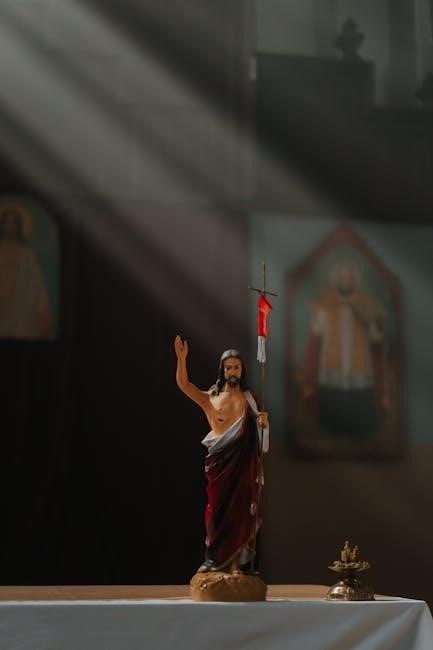
The Church of God Minutes PDF provides insight into church governance, fellowship, and spiritual growth, offering guidance for members seeking to deepen their faith and community involvement.
1.1 Overview of the Church of God
The Church of God is a vibrant community focused on spiritual growth, fellowship, and discipleship. It emphasizes radical living, adhering to Jesus’ teachings, and fostering a supportive environment for believers. The church actively engages in outreach programs, cultural activities, and archival preservation to maintain its heritage. By balancing faith with modern life, it addresses misconceptions about Christianity and encourages members to embrace obedience and joy in their walk with God.
1.2 Importance of Meeting Minutes in Church Governance

Meeting minutes are crucial for documenting decisions, actions, and discussions within the Church of God. They ensure transparency, accountability, and organization in governance. Minutes serve as historical records, tracking progress and decisions, while also providing clarity for future reference. This documentation helps maintain consistency in leadership and decision-making, ensuring alignment with the church’s mission and values. Accurate minutes foster trust and accountability among members and leaders alike.

The Purpose and Structure of Church Minutes
Church minutes document decisions and discussions, ensuring transparency and accountability. They provide a structured record of meetings, including date, time, location, attendees, key points, and action items.
2.1 What Are Church Minutes?
Church minutes are official records of church meetings, detailing discussions, decisions, and action items. They provide transparency and accountability, ensuring all members are informed and aligned with the church’s direction and goals.
2.2 Key Components of Church Minutes
Church minutes typically include the date, time, and location of the meeting, a list of attendees, the agenda or order of business, a summary of discussions, key decisions made, action items with responsibilities, and any financial reports or updates. They may also note prayer requests, announcements, and details about the next meeting. These components ensure clarity, accountability, and continuity in church governance and activities.
Fellowship and Community in the Church of God
Fellowship is central to the Church of God, fostering unity and spiritual growth among members through shared experiences, prayer, and supportive relationships, enriching communal life.
3.1 The Role of Fellowship in Spiritual Growth
Fellowship plays a vital role in spiritual growth by fostering unity, encouraging accountability, and providing mutual support among believers. Through shared prayer, worship, and service, members deepen their faith and strengthen their relationship with God. The Church of God emphasizes communal experiences, ensuring that no one walks alone in their spiritual journey, thereby creating a nurturing environment for holistic development and discipleship.
3.2 Building a Supportive Church Community
Building a supportive church community involves fostering unity, inclusion, and active participation. Through cultural programs, outreach initiatives, and shared activities, members connect on a deeper level. Prayer groups, mentorship, and volunteer opportunities strengthen bonds, creating a network of care. This collective effort ensures that everyone feels valued, supported, and empowered, ultimately fostering a vibrant and compassionate community that reflects God’s love and welcomes all with open arms.
Salvation and Discipleship in the Church of God
Salvation and discipleship form the cornerstone of the Church of God’s mission, guiding members toward spiritual growth and a deeper relationship with Jesus Christ through faith, prayer, and service.
4.1 The Path to Salvation Through Jesus Christ
Salvation through Jesus Christ is a transformative journey rooted in grace and faith. Accepting Jesus as Savior and Lord opens the door to redemption and eternal life. Through His sacrifice, believers find forgiveness and a personal relationship with God. This path emphasizes trust in Christ’s resurrection power and living a life committed to His teachings, leading to spiritual renewal and a deeper connection with the divine.
4.2 Becoming a Disciple of Jesus
Becoming a disciple of Jesus is a lifelong commitment to following His teachings and living according to His will. It involves surrendering to God’s plan, actively seeking spiritual growth through prayer, Bible study, and obedience. Discipleship requires intentional effort to emulate Christ’s love, humility, and radical obedience. The Church of God encourages believers to embrace this journey, fostering a deeper relationship with Jesus and equipping them for meaningful service and witness.

Challenges Faced by Modern Christians
Modern Christians face challenges balancing faith with daily life and addressing misconceptions about Christianity, requiring steadfast commitment and clear communication of their beliefs and values.
5.1 Balancing Faith and Daily Life
Modern Christians often struggle to integrate faith into their busy lives, facing challenges in prioritizing spiritual growth amidst worldly responsibilities. Maintaining a strong connection with God requires intentional habits, such as regular prayer and Bible study. Balancing faith and daily life involves setting clear priorities, seeking support from the church community, and staying mindful of one’s spiritual well-being in a fast-paced world.
5.2 Addressing Misconceptions About Christianity
Many misconceptions about Christianity stem from cultural or societal viewpoints. Some believe it restricts fun or imposes rigid rules, but true Christianity focuses on a personal relationship with Jesus. Understanding God’s grace and love helps dispel myths. Education and community support are key to addressing these misconceptions, fostering a deeper, authentic faith rooted in scripture and fellowship.

The Role of Archives in the Church of God
Archives preserve church history, documenting key events and decisions. They provide valuable resources for research and administration, ensuring transparency and accountability in church governance and operations.
6.1 Preserving Church History
Church minutes serve as vital records, documenting decisions, events, and the evolution of the Church of God. These archives preserve historical context, providing insights into the church’s development and community impact; They act as a resource for future generations, ensuring transparency and accountability. The careful maintenance of these records highlights the church’s commitment to honoring its past while guiding its future. Archivists play a crucial role in this preservation effort.
6.2 The Importance of Archival Administration
Archival administration is essential for maintaining the integrity and accessibility of church records, including minutes. It ensures that historical documents are preserved, organized, and protected for future reference. Effective archival practices promote transparency, accountability, and the ability to learn from past decisions. Programs like the Mellon Foundation’s fellowship highlight the value of professional archivists in safeguarding church history and facilitating research. This role is vital for institutional memory and continuity.

Radical Living and Following Jesus’ Teachings
Radical living involves embracing Jesus’ teachings fully. Greg Stier highlights challenges in modern Christianity, encouraging believers to reflect His love and commitment actively in daily life.
7.1 Embracing a Life of Radical Obedience
Embracing radical obedience to Jesus requires a deep commitment to His teachings. It involves surrendering personal desires for a life aligned with God’s will, reflecting His love and truth. This path demands courage, humility, and trust in divine guidance. Radical obedience transforms lives, fostering a profound spiritual journey and inspiring others to follow Christ’s example. It is a call to live boldly for God, prioritizing faith above all else;
7.2 Challenges to Living Like Jesus
Living like Jesus presents significant challenges, including societal pressures, personal temptations, and misunderstandings of His teachings. Modern Christians face criticism for prioritizing faith, often labeled as rigid or unkind. Additionally, balancing radical obedience with daily life demands discernment and resilience. These challenges require unwavering commitment, prayer, and reliance on God’s grace to navigate effectively and remain faithful to Christ’s example amidst adversity.
Fun and Enjoyment in Church Activities
Church activities often include engaging events that foster joy and togetherness, challenging the misconception that Christianity is devoid of fun, creating a vibrant community experience.
8.1 The Misconception of “No Fun” in Christianity
A common misconception suggests Christianity is devoid of enjoyment, often viewed as the “11th Commandment.” However, this belief contradicts the biblical emphasis on joy and fellowship. Many church activities, such as group games, potluck dinners, and community outings, highlight how faith and fun coexist. These events foster connections, creating a supportive environment where members can enjoy each other’s company while deepening their spiritual bonds.

8.2 Incorporating Enjoyable Activities in Church Life

Incorporating enjoyable activities into church life enriches fellowship and fosters a sense of belonging. Events like retreats, talent shows, and sports outings create opportunities for laughter and connection. These activities help break down barriers, encouraging members to engage beyond traditional worship settings. By blending faith with fun, churches build vibrant communities where joy and spirituality coexist, creating a welcoming environment for all to grow together in faith and friendship.

Cultural and Outreach Programs
Cultural and outreach programs play a vital role in connecting the Church of God with the broader community, fostering understanding and spreading the message of faith effectively.
9.1 Engaging with the Community
Engaging with the community is a cornerstone of the Church of God’s mission. Through outreach programs, cultural activities, and fellowship events, the church fosters meaningful connections, spreading the message of faith and unity. These initiatives not only strengthen community bonds but also provide opportunities for spiritual growth and service, reflecting the church’s commitment to impacting lives beyond its walls.
9.2 The Role of Cultural Activities in Church Outreach
Cultural activities play a vital role in church outreach, bridging gaps between diverse groups and fostering unity. By incorporating music, art, and traditions, the Church of God creates inclusive environments where people from all backgrounds can connect. These activities not only enrich spiritual experiences but also serve as powerful tools for evangelism, helping to spread the message of faith and love within the community.

The Future of the Church of God
The Church of God envisions a future marked by adaptability, growth, and impactful outreach, ensuring its ministries remain relevant while staying true to its foundational values.
10.1 Adapting to Modern Challenges
The Church of God must navigate evolving societal trends and technological advancements while maintaining its core teachings. By embracing innovation, the church can address contemporary issues like balancing faith with daily life and misconceptions about Christianity. Radical living, as inspired by Jesus’ teachings, encourages members to adapt while staying committed to their beliefs. This approach fosters a dynamic, relevant ministry that resonates with modern audiences.
10.2 Vision for Growth and Impact
The Church of God envisions expanding its influence through community engagement and cultural outreach. By fostering a supportive environment, the church aims to inspire spiritual growth and discipleship. Outreach programs and fellowship activities are key to spreading its message effectively. The vision includes nurturing a vibrant, inclusive community that embraces radical living and impactful ministry, ensuring the church remains a beacon of hope and transformation for future generations.